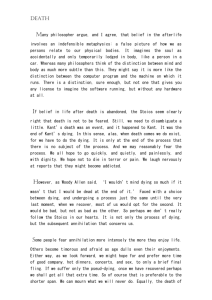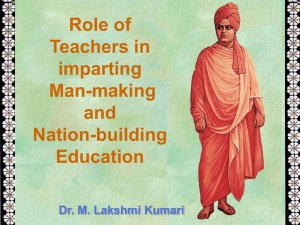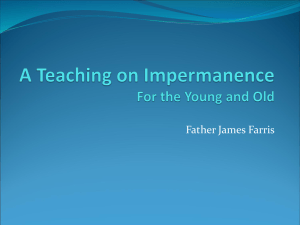Teachings on Impermanence and Death, by Lama Zopa Rinpoche,
advertisement
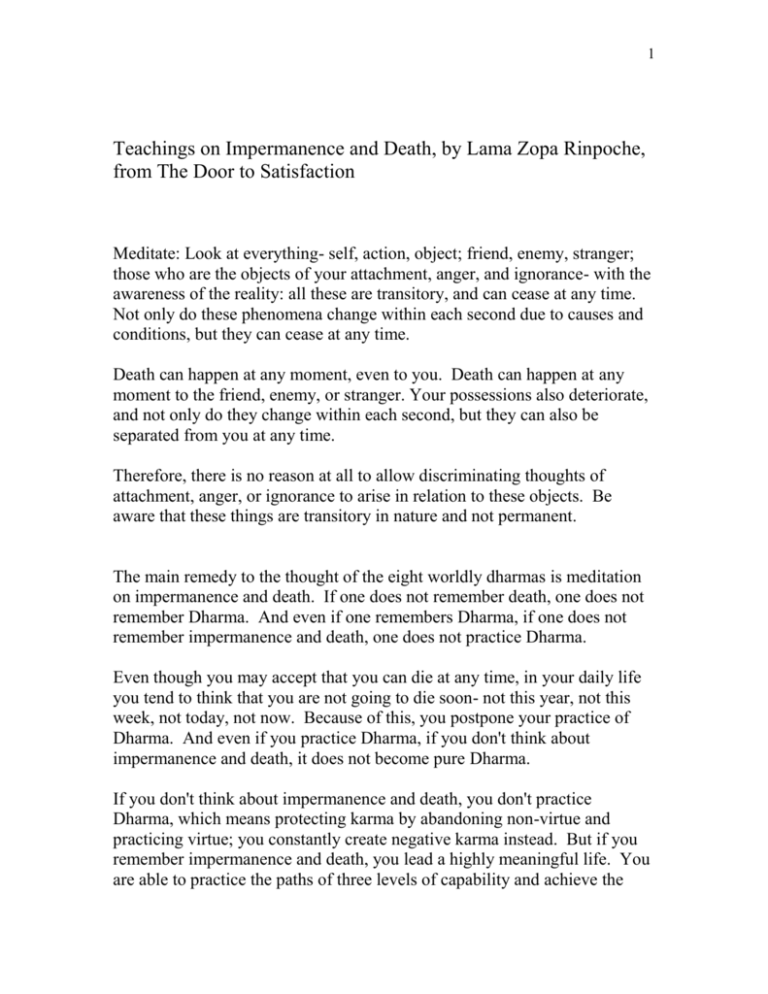
1 Teachings on Impermanence and Death, by Lama Zopa Rinpoche, from The Door to Satisfaction Meditate: Look at everything- self, action, object; friend, enemy, stranger; those who are the objects of your attachment, anger, and ignorance- with the awareness of the reality: all these are transitory, and can cease at any time. Not only do these phenomena change within each second due to causes and conditions, but they can cease at any time. Death can happen at any moment, even to you. Death can happen at any moment to the friend, enemy, or stranger. Your possessions also deteriorate, and not only do they change within each second, but they can also be separated from you at any time. Therefore, there is no reason at all to allow discriminating thoughts of attachment, anger, or ignorance to arise in relation to these objects. Be aware that these things are transitory in nature and not permanent. The main remedy to the thought of the eight worldly dharmas is meditation on impermanence and death. If one does not remember death, one does not remember Dharma. And even if one remembers Dharma, if one does not remember impermanence and death, one does not practice Dharma. Even though you may accept that you can die at any time, in your daily life you tend to think that you are not going to die soon- not this year, not this week, not today, not now. Because of this, you postpone your practice of Dharma. And even if you practice Dharma, if you don't think about impermanence and death, it does not become pure Dharma. If you don't think about impermanence and death, you don't practice Dharma, which means protecting karma by abandoning non-virtue and practicing virtue; you constantly create negative karma instead. But if you remember impermanence and death, you lead a highly meaningful life. You are able to practice the paths of three levels of capability and achieve the 2 three great purposes: always increasing happiness, liberation, and enlightenment. Remembering impermanence and death is also a very easy way to control delusions. You can overpower your delusions. Remembering impermanence and death is very meaningful. It is very important at the beginning of Dharma practice, as it helps you to actually begin your practice, and then again to continue it so that you succeed in your attempt to achieve enlightenment. Milarepa said: Being afraid of death, I escaped to the mountains Now, having realized the ultimate nature of mind, even if death comes, I am not worried (79, 80) Closer and closer to death - death comes to all Death is definite. No medicine can stop death, and there is no place where we don't experience death. No matter how powerful our body is, our life shortens without any break. Each time we recite the mantra om mani padme hung and move a bead on our mala, our life is closer to death with each mantra we finish. When we leave here to go home, each step we take brings us closer to death. When we arrive home, that much of our life is finished. When we drink a cup of tea, with each sip we take, our life is closer to death. When we finish the cup of tea, that much of our life has gone; we are that much nearer to death. Each time we breathe in and out, our life is nearer and nearer to death. 3 Meditate while looking at a clock or a watch; as each second passes, in reality our life is closer to death- but not because we're wearing a watch! Looking at a watch is a very powerful way to meditate on impermanence and death. With each second you are coming closer to death. When we eat a plate of rice, each time the spoon goes to our mouth, our life is finishing. When we finish that plate of rice, that much of our life has gone, and we are that much closer to the time of our death. When we read a newspaper, as we finish each page, we are that much nearer to death. When we talk to people, as we finish each word, we are closer to death. When we complete each sentence, that much of our life has already gone. When we gossip for hours, that much of our life is finished; when we stand up and walk away, our life is that much closer to death. And once a part of our life is over, we can't bring it back or change it. When a boxer or racing car driver injures his body, it can usually be fixed, and this can happen many times. But once our life has passed, whether it has been meaningful or wasted, it has gone forever. You can't fix up any part of your life that has passed; all you can do is work on the present and the future. By making your present life more meaningful, you can fix up the future; you can make a better future. The Graduated Path teachings mention that a life of one hundred years can be divided into two parts: one half is spent sleeping- and this is without daytime sleeping!- and much of the other fifty years of waking time passes in quarreling, sickness, and many other meaningless activities. If we add up all the time spent on what we call practicing Dharma, it is very little. And then you have to die. Even though you have a perfect human body, even though you haven't found time to practice Dharma during your lifetime, you still have to die. (80, 81) The time of death is uncertain Right now there are people dying in hospitals: people with AIDS or cancer whose cases the doctors regard as hopeless, with only one day, a few hours, 4 a few minutes to live. They are regarded as dying because they are close to death, but they still have a short time left to live. They are not dead yet. Think, 'It is the same with me- I am also dying.' It is not that if you have AIDS or cancer, you die, and if you don't have AIDS or cancer, you don't die or don't die soon. It is not like that. Meditate this way when you get up in the morning. Remember that you are dying also, just like the people in the hospital who are regarded as dying. Using the same reasoning, you do not have much time to live. You may even die before those people with cancer who are regarded as dying. You may reason that because they have a certain disease, they will die soon. But this doesn't necessarily follow; it is not logical. Many healthy people who did not have AIDS or cancer have died today. The questions of death does not depend on having disease; even dying soon does not depend on having disease. Even for the healthy, it is the same: death can happen at any time. You are dying. Second by second you are getting nearer to death- there is not much time left. Life is very short. The people with serious diseases are regarded as dying; those who come to visit them are regarded as not dying but as living. But in reality there is no difference. Both are the same, in getting constantly nearer to death, and in not having much time left. On top of all this, death can happen to you at any moment. The actual time of death isn't definite. Generally, in the world, nothing is definite, and during degenerate times such as these, life is even more indefinite. There are few conditions for living and many conditions for death, and even the conditions we need for survival can become causes of death. Life is full of conditions for death. All the delusions within our minds- such as the thought of the worldly dharmas, which induces other negative minds that bring heavy obstacles and heavy karma- are conditions for death. Until now you may not have had any obstacles to your life. Suddenly, today, because of not practicing Dharma and not controlling our mind, you may create heavy negative karma by breaking your vows or in relation to sentient beings or holy objects. Suddenly there may be life obstacles, with signs of death in your dreams or other things happening. Even though you may have the karma to live, suddenly there is danger of death. There are many 5 conditions for death inside your own mind, and in external conditions, which are also created by your own mind. Also, this body is very fragile, like a water bubble. Negative ways of thinking disturb the winds within your body, which then disturb the four elements. Disturbance of the elements causes disease and brings the danger of death. As explained in a commentary on Kalachakra, the inner and outer elements are related. If the four inner elements are disturbed, the outside elements are also disturbed. These can threaten your health and your life, even becoming the conditions for your death. Remember the many people we have known, who have been close to us, that have died. Think of our kind friend: during the time we spent with him, he was very real to us, laughing and making jokes. We enjoyed so much being with him, he seemed somehow permanent, truly existent, real. But they have gone now. We have just the memories. Even famous people have died. Even Mao Zedong, though he had a large army and frightened many people, he doesn't exist not. Indra Ghandi was well known to the world, with her pictures everywhere. Despite her popularity and military power, she is gone; she doesn't exist now. By this time next year it is possible that like those who have already died, only your name will be left. Of those who have died, there are now left only their names written in letters, their pictures, and people still mentioning them. By this time next year, this could have happened to you. Nothing to be seenonly your name to talk about and pictures to look at. As you do in tantric practice, bring into the present what is going to happen in the future. Meditate on your death now. Think of your body in a coffin being taken from your home to the cemetery, being buried there under the ground. Or meditate on your body in a coffin about to be cremated. Only your possessions are left. Think about this. 6 When death happens, even though the body completely disintegrates, the consciousness continues. When the butter in a butter lamp finishes, the flame stops, but the consciousness is not like this. Consciousness continues from life to life. (82, 83, 84) Think about karma and rebirth. Whether you will have a good or a bad rebirth depends on whether your karma is good or bad. Remember that your death can happen suddenly. You may be active, working, when suddenly your eyes roll up and you die. Suddenly, in the middle of doing something, your body becomes a corpse, with no breathing, no movement. This can happen to you at any time. People have died while drinking tea; just before the cup reaches their lips, they die in the chair. People die before finishing the food on their plate. Everyday people are dying in the middle of doing something. This happens every day. (85, 86) Making this life meaningful The best thing to do is to recite every morning, 'I am going to die today.' This cuts off all problems. Once you have this thought, there are no more problems. Problems come from your wrong ideas, your wrong conceptions. Thinking that you are going to die today cuts off these conceptions and problems. You are going to die today- so what are you going to do with your life? Just thinking that you are going to die today is not sufficient; the thought should persuade you to practice Dharma and not waste your life. What are you going to do? Whether you live another hour or another hundred years, what are you going to do with your life? At this time, when you have this question, it is very good to remember the verse from Lama Chopa: Cherishing myself is the source of all sufferings, while cherishing others is the basis of all qualities. 7 Please grant me blessings to do the heart practice, the yoga of exchanging myself for others. Here you have the answer: the heart practice is contained in the above verse. Whether or not you are able to recite many prayers, study extensively, or sit in meditation, this is the essential, most meaningful practice. Simply by thinking of the words of this verse- that cherishing the self is the basis of all obstacles and sufferings, and cherishing others the basis of all qualities- you are able to change the object of your concern. Before, your concern was only for yourself, but just by saying these words, you change the object of your concern from the self to other sentient beings suffering in the six realms. Constantly keep the thought of other sentinet beings in place of the I. Change from cherishing the I to cherishing others. Always hold this thought in your heart and do all your actions on the basis of this attitude. From morning to night, do everything- meditation, prayers, study, eating, talkingon the basis of this attitude. In your heart, do everything for all sentient beings. (86, 87)
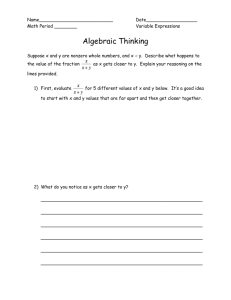

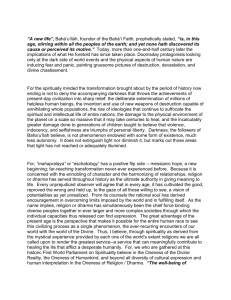
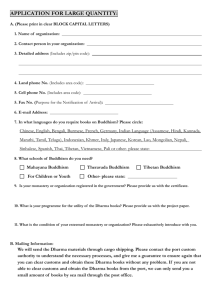

![[#SEAD-614] Create Project Space for Moore Lab Group](http://s3.studylib.net/store/data/007834021_2-e246955aacca9cfb92a906a1234e44a5-300x300.png)
